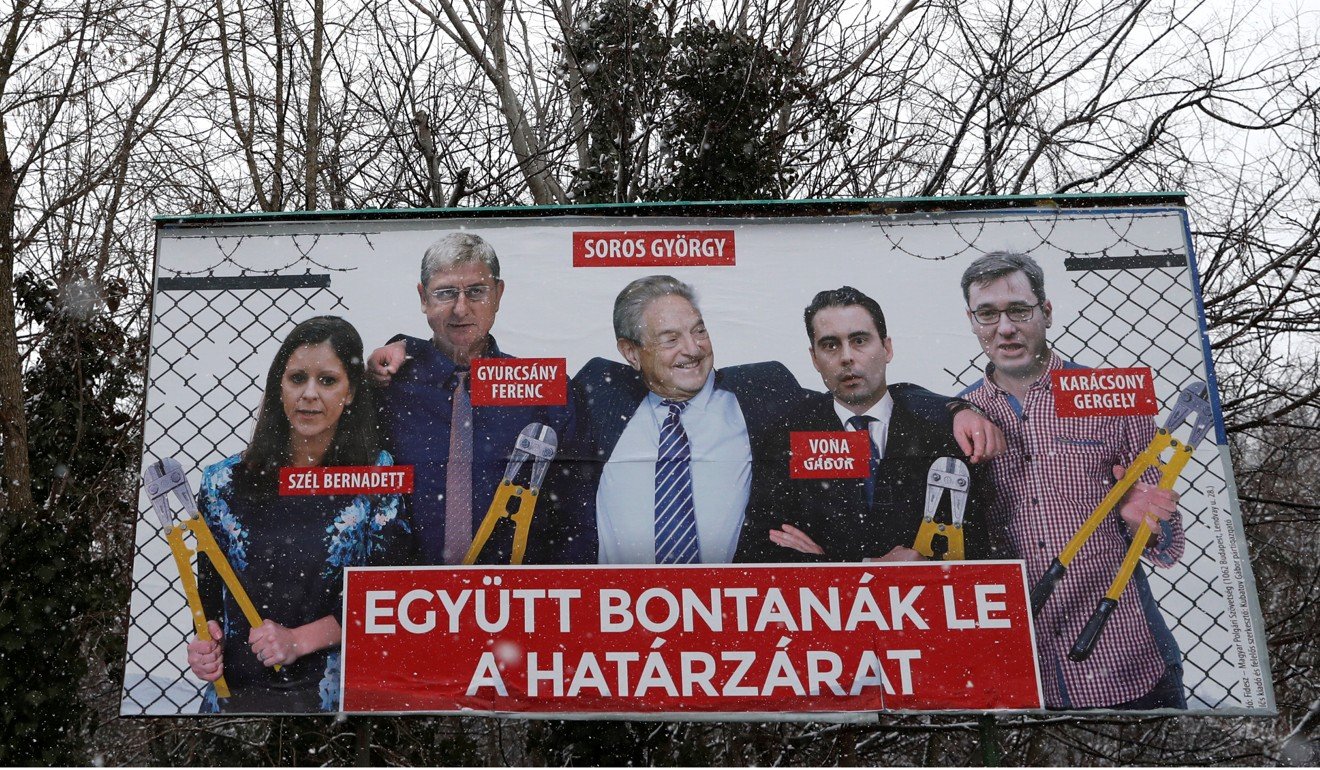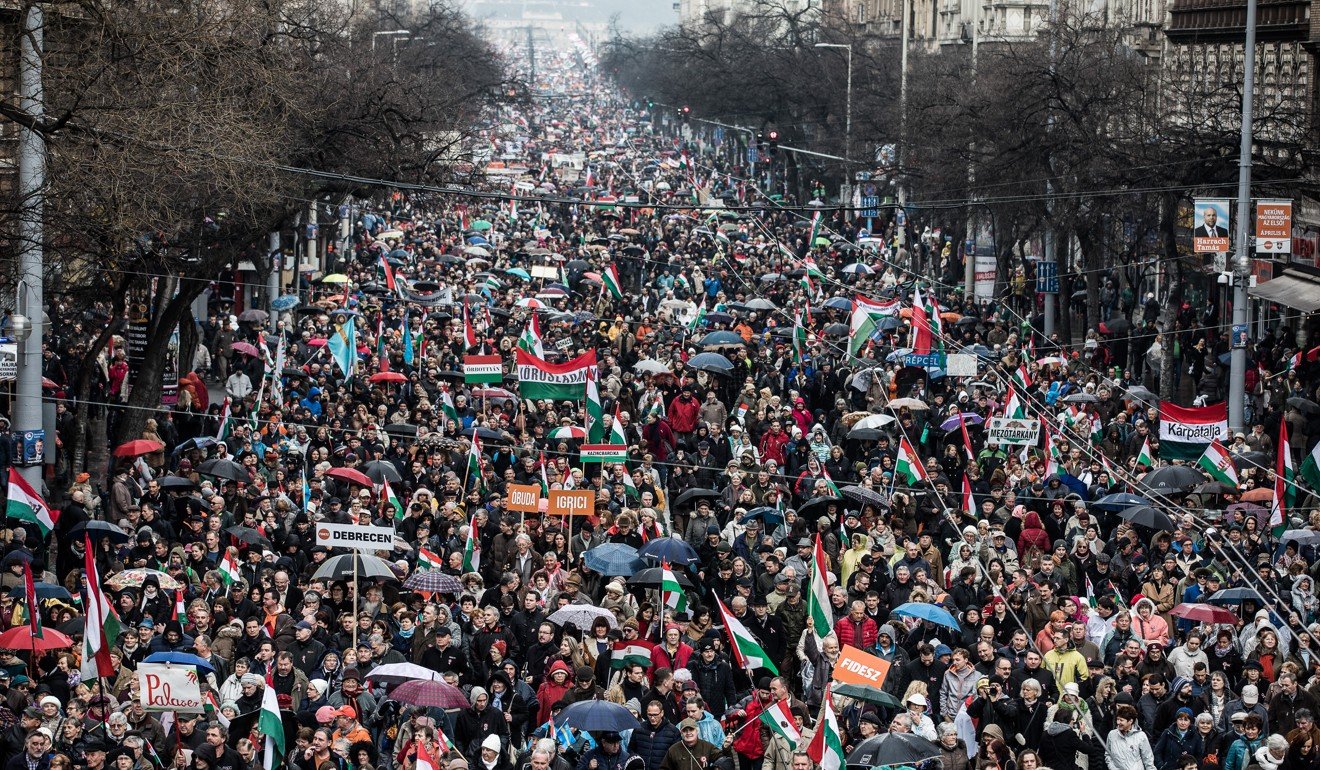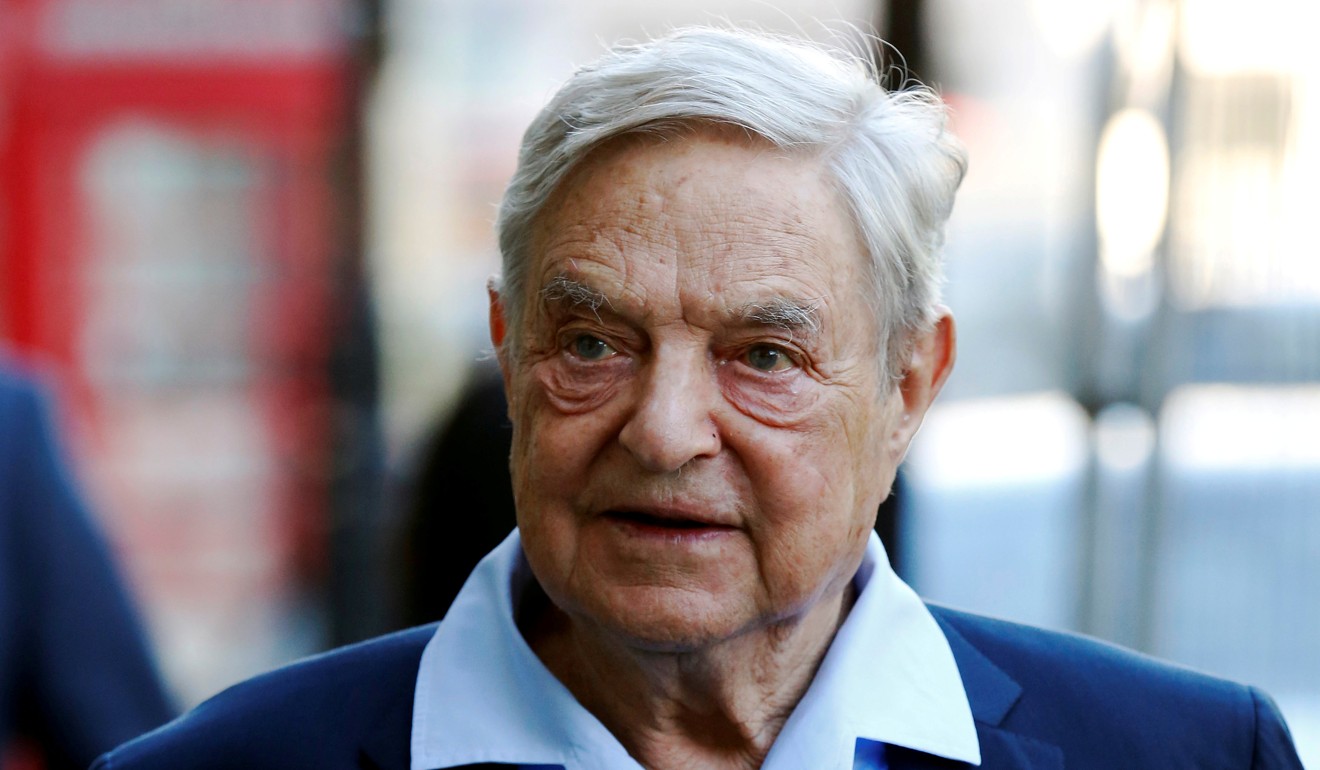
Analysis | Conspiracy theories about billionaire George Soros take centre-stage in Hungarian election
Since regaining power eight years ago, Prime Minister Viktor Orban has built a self-styled illiberal state modelled on Russia, with a fragmented opposition and a relentless focus on the threat of immigration, which he says is being promoted by Hungarian-born billionaire George Soros
After eight years of bending this nation to his increasingly autocratic and illiberal will, Hungarian Prime Minister Viktor Orban has only a smattering of disorganised opposition parties to overcome on the road to winning four more in elections next month.
But in his own telling, he is locked in an epochal struggle with a far more worthy competitor: a shadowy international puppet-master whose dangerous ideas and limitless resources put him on par with the great invaders and occupiers defeated across centuries of Hungarian history.
“We sent home the [Ottoman] sultan with his army, the Habsburg kaiser with his raiders and the Soviets with their comrades,” Orban thundered to an adoring crowd of more than 100,000 people in central Budapest last week.
“Now we will send home Uncle George.”
George Soros, that is.
With his left-wing views and deep pockets, the 87-year-old New York-based financier and philanthropist has in recent years become the ultimate bogeyman for far-right ideologues, demagogic despots, tin-hat conspiracy theorists and anti-Semites the world over.
But nothing compares to the intimacy and intensity with which he is now being assailed in his native land. As Hungary’s parliamentary campaign enters its final weeks, Orban has made attacks on his one-time benefactor the centrepiece of his re-election campaign.
Although Soros has not visited Hungary in years, his craggy face is a constant here, peering out from bus stations and looming over motorways as part of a ruling-party advertising campaign.
The ads put a dark spin on Soros’ call for a more welcoming approach to refugees, suggesting that the billionaire has a secret plan to flood the nation with migrants.

The campaign goes well beyond rhetoric. Orban warned ominously Thursday that Soros’ allies in Hungary would face “revenge” after the April 8 vote, and there are already indications of a crackdown to come.
The prime minister’s party has vowed to pass legislation that would severely curtail the work of non-governmental organisations. Such groups, many of which are funded by Soros, are among the last remnants of Hungarian society that haven’t fallen prey to the ruling Fidesz party’s iron grip. The prime minister has dubbed the bill the “Stop Soros” law.
“It’s not just an election trick,” said Marta Pardavi, co-chair of the Hungarian Helsinki Committee, a human rights group.
“There’s a very strong determination on the part of the government to not only stigmatise NGOs, but to make it very hard for them to even operate.”
Orban’s demonisation of Soros, to the exclusion of virtually all other issues, reflects just how far Hungary has drifted from the European mainstream since his election in 2010.

A fringe obsession in other parts of the West, Soros-bashing in this nation of 10 million has moved to the very centre of political debate.
The focus is meant to distract voters from paying attention to any other issues, said Csaba Csontos, spokesman for the Budapest branch of Soros’s Open Society Foundations.
“Unfortunately, Fidesz has no other message,” he said.
It is not clear the party needs one; Fidesz has about as much support in the polls as all other parties combined.
And far from being a pariah in the European Union, Orban is increasingly seen as a model for electoral success.
Power players in nations such as Germany and Austria have embraced his uncompromisingly hostile stance toward immigration two years after the continent reckoned with an unparalleled influx.
That mass movement of people – Europe’s refugee crisis of 2015-2016 – is where Hungary’s anti-Soros campaign began.

The scenes of hundreds of thousands of people making their way through the continent – replayed endlessly on television for months – came at a fortuitous time for Orban.
His popularity had been starting to slip as the focus turned to plans for a tax increase and to alleged Fidesz corruption.
Orban seized the moment to change the conversation. While other European leaders waived asylum seekers through their territory, Orban tried to block their path to destinations deeper in Europe. For several days in the late summer of 2015, he forbade them from travelling by train or bus, creating a backlog of thousands of frustrated people living on the streets of central Budapest.
Then he finished building a fence on the country’s southern border. Other nations soon followed in closing their crossings, and for the past two years the once-saturated refugee trail has been largely empty.
But Orban has kept the issue front and centre by warning of the “Muslim invasion” to come in “Christian Europe,” and fingering “the international speculator” Soros as its mastermind.
The message resonates with Orban’s base, which tends to be older voters from rural areas who are suspicious of all that Soros represents: globalisation, multiculturalism and, at least for some in a country where anti-Semitic currents can still run strong, the Jewish faith.
“It’s the good old method of the Frankenstein monster,” said opposition party leader Bernadett Szel, who recounted being denounced as a “traitor” by Orban supporters for spending several months helping refugees through a Soros-funded NGO.
“You create an enemy, then tell people that only you can protect them from this enemy.”
Soros and Orban, perhaps the world’s two best-known living Hungarians, have a history together. Orban was a young democratic activist in the dying days of communist control in the late 1980s. Soros funded a scholarship for him to study at Oxford, and even helped with the launch of Fidesz, which began as a liberal student movement.
If Orban – a man whom even critics describe as brilliant, with ego and ambition to match – has felt gratitude to the Budapest-born Holocaust survivor, he has not shown it.
Last summer, the government posted billboards across the country depicting a grinning Soros and the words: “Let’s not allow George Soros have the last laugh!” Several were defaced with anti-Semitic graffiti.
That was followed by a supposed “national consultation” in the fall in which the government mailed surveys to every household in Hungary.
The survey asked a series of leading questions, including whether respondents supported the “Soros plan” to “resettle at least one million immigrants from Africa and the Middle East annually on the territory of the European Union, including Hungary”.
Soros dismissed the survey as a collection of “distortions and outright lies” that employed “anti-Semitic tropes reminiscent of the 1930s.”
The latest anti-Soros campaign – tied to the election – is a doctored image of Soros with his arms around opposition leaders, each of whom hold wire-cutters they are using to break down the border fence.
Soros has long advocated what he describes as a more humane approach to those displaced by war and oppression, of whom there are a record 66 million worldwide, according to UN data.
He has poured billions of dollars into groups, parties and politicians that work on behalf of asylum seekers and other marginalised groups, and has denounced leaders who use xenophobia to whip up support.
Those activities all make him a legitimate target, said Fidesz party spokesman Balazs Hidveghi.
“If you enter the political arena, you should not be surprised by a political answer,” he said.
In his speech on Thursday in Budapest to mark Hungary’s independence day, Orban scarcely mentioned the economy, health care, education or any of the other issues that might be at the heart of a re-election campaign after eight years in power.
Instead, he spent nearly the entire 25-minute address depicting what he described as a “clash of civilisations” between the patriotic defenders of a traditional Christian nation and “international forces” that want to repopulate Europe with Africans.
“We will fight against the Soros empire,” he vowed.
His flag-waving backers, who spilled out of the city’s grand parliamentary square and deep down several side streets in one of the larger demonstrations of the country’s recent history, cheered and pronounced themselves ready for the battle.
One group of supporters came with a life-size Soros cut-out, the mouth taped shut, as well as a placard depicting Soros as the Austin Powers-series villain Dr. Evil. A Hungarian retiree who lives in Paris came with a home-made sign denouncing Soros in French.
“Soros is the mastermind behind the Islamisation of Europe,” said the woman, 64-year-old Gyongyi Horgasz. “But he’s also a puppet.”
For whom? She wouldn’t say.
“A superior power,” she said, smiling knowingly.
“I don’t want to give any names.”

